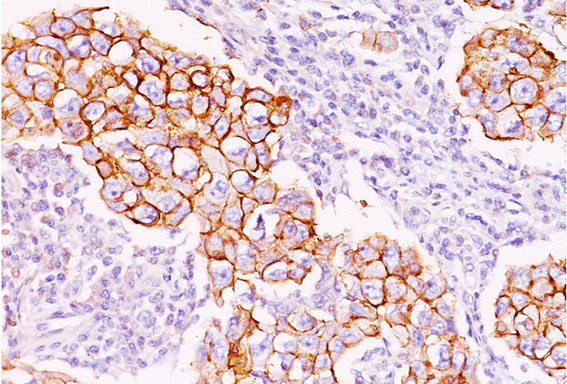Phosphotyrosine Mouse Monoclonal Antibody [Clone ID: SPM102]
Specifications
| Product Data | |
| Clone Name | SPM102 |
| Applications | FC, IF, IHC, IP, WB |
| Recommended Dilution | ELISA: Use BSA free Antibody for Coating. Western Blot: 0.5-1 µg/ml. Flow Cytometry: 0.5-1 µg/106 cells. Immunofluorescence: 1-2 µg/ml. Immunoprecipitation: 1-2 µg/500 µg protein lysate. Immunohistochemistry on Frozen and Formalin-Fixed Paraffin Sections: 1-2 µg/ml for 30 minutes at RT. No special pretreatment is required for staining of formalin/paraffin tissues. Recommended Positive Control: MCF-7, MDA-231, T47-D cells or breast carcinoma. |
| Reactivities | All Species |
| Host | Mouse |
| Isotype | IgG2b |
| Clonality | Monoclonal |
| Immunogen | Phosphotyrosine conjugated to KLH |
| Specificity | Antibody to phosphotyrosine provides an excellent tool for the detection, characterization, and purification of phosphotyrosine containing proteins. This Monoclonal antibody shows no cross-reaction with other phosphoamino acids and is superb for multiple applications including staining of formalin/paraffin tissues. Cellular Localization: Depends upon the location of phosphorylated target. |
| Formulation | 10mM PBS State: Purified State: Liquid purified IgG fraction from Bioreactor Concentrate Stabilizer: 0.05% BSA Preservative: 0.05% Sodium Azide |
| Concentration | lot specific |
| Purification | Protein A/G Chromatography |
| Conjugation | Unconjugated |
| Storage | Store undiluted at 2-8°C. DO NOT FREEZE! |
| Stability | Shelf life: one year from despatch. |
| Predicted Protein Size | Depends upon the phosphorylated target |
| Background | Protein phosphorylation is a fundamental event in the regulation of a large number of intracellular processes. Phosphorylation of specific tyrosine residues is the result of activation or stimulation of their respective protein tyrosine kinases. The phosphorylated proteins can be auto-phosphorylated kinases or certain cellular protein substrates. Tyrosine-phosphorylated proteins are involved in signal transduction and in the regulation of cell proliferation. |
| Reference Data | |
Documents
| Product Manuals |
| FAQs |
| SDS |
{0} Product Review(s)
0 Product Review(s)
Submit review
Be the first one to submit a review
Product Citations
*Delivery time may vary from web posted schedule. Occasional delays may occur due to unforeseen
complexities in the preparation of your product. International customers may expect an additional 1-2 weeks
in shipping.






























































































































































































































































 Germany
Germany
 Japan
Japan
 United Kingdom
United Kingdom
 China
China



